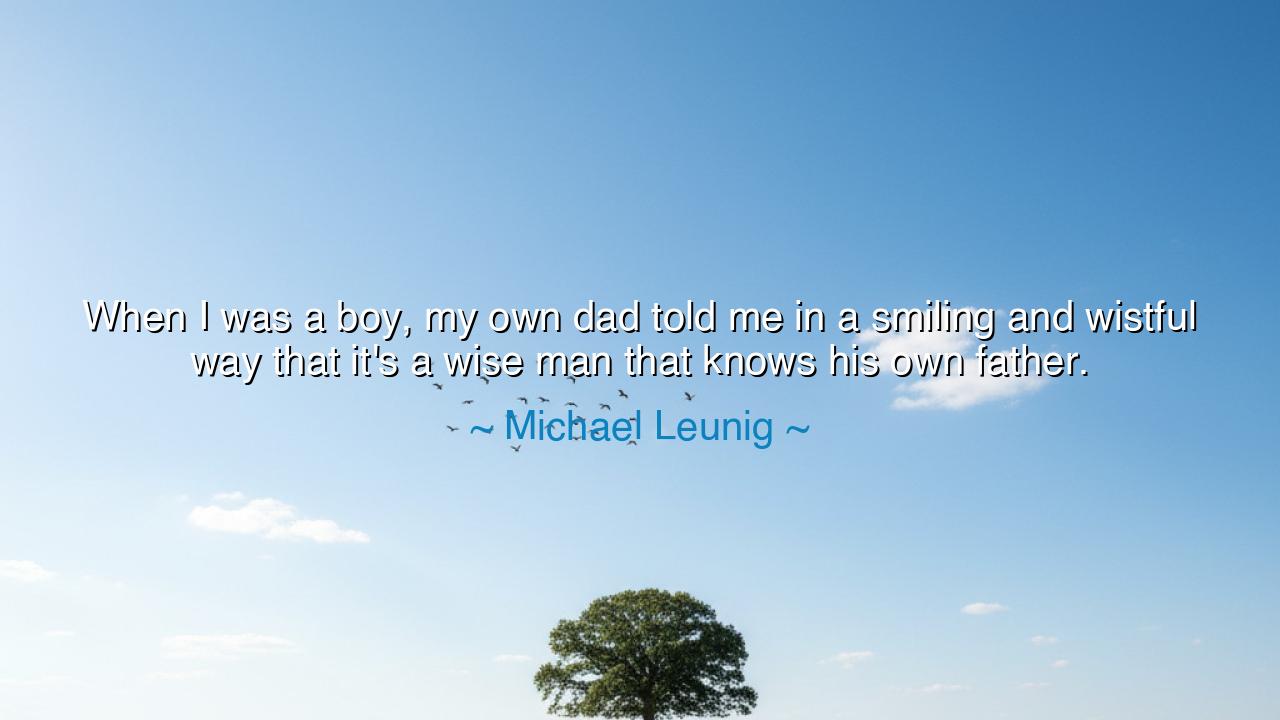
When I was a boy, my own dad told me in a smiling and wistful way
When I was a boy, my own dad told me in a smiling and wistful way that it's a wise man that knows his own father.






When Michael Leunig reflected, “When I was a boy, my own dad told me in a smiling and wistful way that it’s a wise man that knows his own father,” he spoke of a wisdom as deep and ancient as the roots of the human heart. Beneath the simple tenderness of these words lies a profound truth: that to know one’s father — truly and compassionately — is to understand not only another man, but the story from which one’s own life flows. For every father is both a mystery and a mirror; he is the soil in which his children grow, yet often remains unseen beneath their roots. To know him is to know oneself, to reconcile love with understanding, and inheritance with empathy.
The origin of this reflection comes from Leunig’s writings and musings on family, love, and the fragile beauty of human connection. Leunig, an Australian cartoonist and philosopher, often wove gentle humor with deep spiritual insight. In this saying, he recalls a moment of intimacy — a father passing on a truth not through instruction, but through a quiet smile. That smile, “smiling and wistful,” carries the whole weight of human longing — the knowledge that few ever truly understand their parents, and fewer still take the time to try. It is both a challenge and a confession: that wisdom begins not with judgment, but with the patient, tender act of seeing another human being — even one so close as a parent — as they are.
To know one’s father is no small task, for a father is often the most hidden figure in a life. Many grow up seeing him only as authority or provider, never pausing to ask what fears or dreams shaped him, what wounds he carried in silence, what sacrifices he made unseen. And yet, as we grow older, the veil begins to lift. We begin to see that fathers — like all mortals — are not monuments of perfection, but pilgrims of their own uncertain path. To know them is to pierce through the myth of parenthood and see the beating heart beneath. That revelation requires humility, for one must set aside the pride of youth and the simplicity of judgment. It is, as Leunig says, the mark of a wise man, not merely a dutiful son.
History itself gives us echoes of this truth. Consider the story of Telemachus, the son of Odysseus in Homer’s Odyssey. For twenty years, the boy grew up without his father, hearing only tales of the hero who had fought at Troy. When at last Odysseus returned, disguised and weary, Telemachus did not recognize him. Only after trials and revelations did the son come to know the man behind the legend — a father flawed, wise, and deeply human. This reunion is not just a tale of recognition, but a spiritual awakening: the moment a son understands his father not as a figure of myth, but as a fellow traveler through suffering and hope. That moment, too, is wisdom — to see one’s father not as he was imagined, but as he truly is.
And yet, Leunig’s reflection extends beyond the personal. To know one’s father is also to know one’s lineage, one’s heritage — the chain of human experience stretching back through generations. Each father carries the imprint of his own father, and so on into the past, where forgotten dreams and unspoken griefs have shaped the lives that followed. When we begin to know them — through stories, through silence, through reflection — we come closer to knowing ourselves. For our lives are not islands; they are rivers flowing from ancient sources. To understand the current, one must look upstream.
But to reach that wisdom, one must approach with compassion. Many fathers are flawed, distant, or broken; many sons and daughters bear wounds that make understanding difficult. Yet even in that pain lies an invitation. To seek to know them — not to excuse, but to understand — is to reclaim something sacred: the humanity that unites generations. To forgive is not to forget, but to see clearly; to know one’s father is to embrace the truth that love, though imperfect, endures through the cracks of time. Wisdom, in this sense, is not knowledge of facts, but of hearts.
So, my child, remember this teaching: seek to know where you came from, not only in name but in spirit. Speak to your elders, listen to their silences, and try to glimpse the person behind the parent. In doing so, you will find more than biography — you will find compassion, and perhaps the first light of wisdom. For the day you begin to understand your father — his burdens, his love, his humanity — is the day you begin to understand your own. And that, as Michael Leunig’s father once said, is the mark of a truly wise man.






AAdministratorAdministrator
Welcome, honored guests. Please leave a comment, we will respond soon